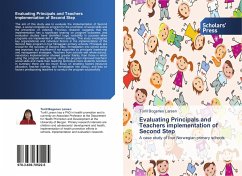The aim of this study was to evaluate the implementation of Second Step, a social competence program for the promotion of social skills and the prevention of violence. Previous research suggests that the implementation has a significant bearing on program outcomes; and evaluation studies have identified huge variability in success when programs are implemented in different settings. This study investigated key organizational and individual factors in the implementation of the Second Step program in four Norwegian primary schools. Principals are crucial for the success of Second Step; formalization into school policy was important, but insufficient if not supported by principals leadership and management strategies. Teachers from schools with whole-school, mandatory implementation showed greater fidelity, than those in which using the program was optional. Using the program improved teachers social skills and made their teaching technique more students oriented. In summary there are too much focus on enabling factors (resource allocation, teacher training, and formalization into policy), and less on factors predisposing teachers to conduct the program successfully.
Bitte wählen Sie Ihr Anliegen aus.
Rechnungen
Retourenschein anfordern
Bestellstatus
Storno








